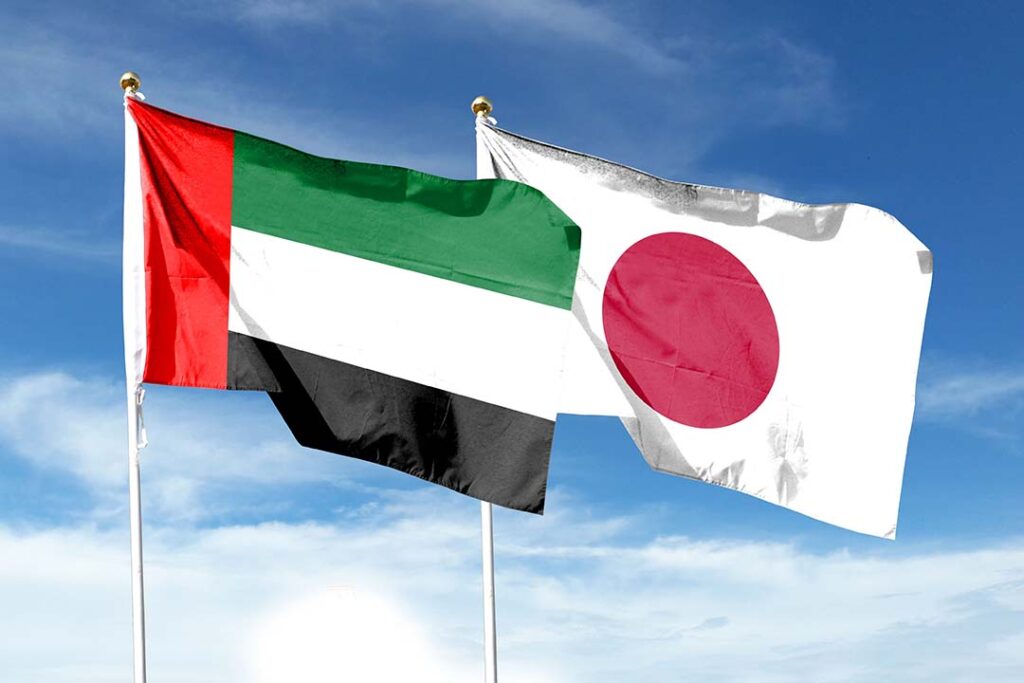A message from Koichi Ito, Japan’s ambassador to New Zealand
One example of this partnership is the hydrogen-energy sector. New Zealand is rich in renewable energy resources, including — but not limited to — hydro, geothermal and wind power, which all can be used to generate green hydrogen, a carbon-neutral fuel source. If collaboration between Japan and New Zealand can result in the successful utilization of these energy sources, it will not merely contribute to addressing climate issues, but also create new opportunities for sustainable energy supplies.
Japan has a goal to achieve net-zero emissions by 2050 and realize a carbon-neutral society. Naturally, as New Zealand holds a very similar goal, both countries will undoubtedly benefit by working together in this area. Advancing cooperation in climate change between the two countries will in turn help enhance the prosperity and well-being of Pacific Island Countries. The Pacific Climate Change Center in Samoa is representative of bilateral cooperation in this area.
Japan and New Zealand are vital economic partners with a commitment to free trade. They have worked closely together to implement an ambitious, comprehensive, balanced and high-standard agreement known as the Comprehensive and Progressive Agreement for Trans-Pacific Partnership. Thanks to these efforts, more Japanese can now enjoy New Zealand’s key export products, including beef, dairy, kiwis and manuka honey. I highly expect we can keep developing this mutually beneficial relationship.
The Japan-New Zealand relationship has proved an enduring one after almost 70 years. The unwavering relationship will continue to allow us to overcome any challenges and bring nothing but success in our future collaboration.
“The unwavering relationship will continue to allow us to overcome any challenges and bring nothing but success in our future collaboration.”
Koichi Ito, Japan’s ambassador to New Zealand
Business Leaders share their insights on New Zealand – Japan relations:
About 84% of New Zealand’s electricity is currently generated by renewables. The government is committed to increasing this figure to 100% by 2030. New Zealand is also committed to becoming a carbon-free economy by 2050. Achieving these targets will require a major transition from fossil fuel to electric energy for industry and next generation vehicles.
It has been estimated that we will need to expand electricity generation by 70% and at the same time become 100% renewable, a huge challenge for New Zealand.
Japanese companies such as Sumitomo, Fuji Electric and Toshiba, have been providing turbines to geothermal power plants in New Zealand. New Zealand has world-class knowledge in identifying and drilling for the resource under the ground while Japan’s expertise is above the ground in machinery and turbines and we see synergies here.
Having successfully traded food, forestry products and fisheries from New Zealand in exchange for cars and machinery from Japan, renewable energy is set to be the next trend. Japan needs to expand its renewable energy capability and hydrogen energy is a shared area of interest.
We should never underestimate the value of ongoing trade but value-added sectors driven by innovation and creativity, particularly renewables, robotics and technology are increasingly important.
In terms of goods, we have seen an expansion of trade. Particularly, fresh fruits, vegetables, kiwifruit, are all ‘growing’. Meat, dairy and aluminium trading also continue to do well.
With so many complementary factors between Japan and New Zealand, the two countries have developed a very natural partnership. I would like to see a resurgence of people to people contact as New Zealand and Japan are both relationship-based countries. When we get to know one another as friends, we find we have a great deal in common.
Maori are the indigenous people of New Zealand, and Maori businesses-owners and entrepreneurs are a very important part of the New Zealand economy.
Under the Treaty of Waitangi, land and resources have been returned to Maori ownership and Maori marketing and business skills, interestingly, seem to be very compatible with Japanese values. Timescales are long-term and the focus is on ensuring sustainable development ensuring the environment is protected.
Responsibility lies with the current generation is to pass on the resources of the land, sea and rivers to the next generation in an unspoiled way, a vision very similar to the long-term approach to doing business in Japan.
There is a very warm relationship between Japan and New Zealand in the political and business fields and at a grassroots level – we have 47 sister cities and many bilateral friendship associations.
Japanese investors are welcome in New Zealand because experience has shown they are export orientated, they respect New Zealand management practices, they generate employment and look to contribute to the local economy.
—Mr. Ian Kennedy, Chair, Japan New Zealand Business Council
We have a special relationship with Japan based on our shared values. The warm hospitality of Japanese people expressed through omotenashi is similar to manaakitanga, the Māori concept of hospitality and mutual respect.
Following the 2019 Rugby World Cup we saw that Japan’s awareness of New Zealand began to increase. Demand for travel to New Zealand will return once borders open and airlines start flying again and the role we have to play is to keep New Zealand alive in the hearts and minds of Japanese people until they can travel.
Japan is one of our largest markets in Asia, second only to China.
Japan’s long-standing relationship with New Zealand has served both countries well over the years. We enjoy a solid and mature partnership based on longevity.
—Greg Wafelbakker, General Manager Asia, Tourism New Zealand
New Zealand is becoming a Tech-hub for innovation. Some of the most recent trends involving New Zealand and Japan have been in the technology sector, with more and more start-ups and digital solution companies entering the picture. Just as Japan pushes for renewable and green energy solutions, New Zealand can play a strong role in helping achieve 2050 decarbonization goals through our leading ‘Green-Tech’ companies’. We look forward to connecting and strengthening our relationships with our global partners, especially through our newly established TIER (Tech, Innovation, Education and Research) committee.
New Zealand’s food produce is seen as high-quality in Japan. This perception has proven itself during these hard times as consumers turn to reliable New Zealand natural products such as dairy, Manuka honey and kiwi fruit.
The Comprehensive and Progressive Agreement for Trans-Pacific Partnership (CPTPP) has opened the doors for the New Zealand dairy and wine industries, among others, to better supply the Japanese market and has improved trade opportunities.
—Emily Hallams, Executive Director, Australian and New Zealand Chamber of Commerce in Japan
The trade relationship between our two countries is strong and today, our bilateral trade sits at around NZ$9 billion.
Japan and New Zealand’s trade relationship is highly complementary. Despite the challenges COVID-19 has placed on supply chains, goods exports to Japan for the period January to December 2020 were up 1.7% on the same period in 2019 and at the highest level since 2010.
Covid has accelerated a heightened awareness regarding well-being, health and nutrition. This is advantageous for New Zealand as we have visibility throughout the supply chain and a robust regulatory system.
Japan has been a very keen supporter of the CPTPP and this has already had a positive impact on its bilateral trade with New Zealand, including the primary produce, and horticultural sector.
Japan and New Zealand are both somewhat isolated island nations which has fostered an innovative nature due to our limited resources. Our cultures are based on trust and respect and we value long term relationships when doing business. These synergies have driven strong alliances between our two countries which I am sure will continue, enhanced by CP-TPP.
—Jason Reeves, Head of Export Business Development, Partnership Banking, Bank of New Zealand
The acquisition of UDC Finance by Shinsei Bank last year was seen as a vote of confidence in both UDC and the New Zealand economy. Due to their significant experience in the industries that UDC is invested in Shinsei Bank has a good understanding of, and respect for what we do in New Zealand.
Japan has been a long-term investment partner for New Zealand. We continue to see Japanese companies making strategic investments and forging partnerships across New Zealand’s key industries.
—Wayne Percival, CEO, UDC
Japan has consistently been one of our top 5 export markets due to its favorable trading environment and high-value profile which favors chilled quality-beef and sheep cuts. The CPTPP Agreement is of huge value for the industry and tariff reductions mean our products are more competitive in the Japanese market.
Our chilled meats are seen as a luxury or high-end product due to their flavour and texture and this resonates within Japan’s cuisine and eating habits. We value the Japanese market as an important and sophisticated market which appreciates our products and our trade relationship is very strong.
New Zealand meat is produced in a very natural way. All our sheep and beef products are sourced from free range, antibiotic and hormone free farms and these factors contribute to the quality and safety of the meat we export.
Health and wellbeing became more important during the pandemic as consumers became more interested in where their products came from and how they were produced. New Zealand has a very good story to tell. We are world leaders in food safety with systems and regulations in place to ensure natural production systems.
—Sirma Karapeeva, CEO, Meat Industry Association:
Our avocados are shipped via sea freight in temperature-controlled containers and meet the regulations of the Horticulture Export Authority Act. Avocados exported from New Zealand have to meet industry standards, all of which are verified independently. Japan was our first export market in Asia and remains an important market for New Zealand’s avocado industry.
Though our exports to Japan came to a halt in 2020 due to COVID-19 and disruptions in the supply chain, 2021 looks much better. Exporters are actively pursuing opportunities in the Japanese market and anticipate returning to supply levels that previously reached over 300,000 trays. New Zealand exporters are aware that Japanese consumers appreciate avocados and New Zealand’s role as a safe, fresh fruit producer. Our Japanese customers appreciate high-quality, ready to eat, ripened avocados.
—Jen Scoular, Chief Executive Officer, NZ Avocado
Japan took the lead to bring CPTPP to fruition, effective from 30/12/18. This has been very positive for business between Japan and New Zealand. New Zealand’s exports to Japan for year end 31/12/2020 were up 1.7% despite COVID. Large increases for apples, honey, pumpkins, squash, milk products, beef, and kiwifruit.
Digital commerce is also accelerating business between Japan and New Zealand. Japanese consumers are increasingly looking for healthy, quality products online. New Zealand food and beverage products purchased on Rakuten’s marketplace increased 73% year on year, assisted by New Zealand Trade and Enterprise’s engagement with Rakuten to promote NZ products.
Rugby is big business and the Rugby World Cup 2019 held in Japan heightened awareness. With New Zealand being such a heavy weight in rugby, momentum between Japan & NZ continues to build. There is always a cohort of All Blacks (former and present) playing in Japan. (Star performer, Beauden Barrett, is currently playing for Japan top league).
—Annette J. Azuma, Director, Business Advisory Services, Baker Tilly Staples Rodway
Plant & Food Research, a New Zealand government-funded science organisation has been researching the health benefits of New Zealand blackcurrants for the last decade. This includes work with Japan’s Aichi Gakuin University which looked at the presence of sugars in the berries and their effect on bioavailability. With scientific evidence mounting around the health benefits of New Zealand blackcurrants the New Zealand Blackcurrant Cooperative have set up a new brand called Adaptive™ which has now been licenced through the Japan Casiss Association
—Gavin Ross – Group General Manager, Marketing & Innovation, Plant & Food Research New Zealand
Compared to ‘old world’ wines, New Zealand has developed a reputation as a high-quality, good value wine producer.
As a country, New Zealand is very friendly and welcoming to newcomers. Today there are around ten Japanese wine producing companies in New Zealand.
The global wine market is highly competitive and New Zealand has created delicate and highly-appreciated wines for customers around the world. Many of the country’s wine producers have developed a sustainable winemaking philosophy and are creating an industry with a focus on environmental awareness while continuing to make great wines.
—Shin Saito, Director, All New Zealand Wines Limited
The Mitsubishi Motor brand is in a good position in New Zealand. We enjoy a very positive reputation and have been present in New Zealand since 1968.
We are currently the third largest Japanese automotive brand in the New Zealand market although we often tussle for the number two position in terms of monthly sales. We are not reliant on just one model for our success and we compete in all segments. Our range of vehicles are well-suited to the market here as New Zealanders enjoy driving and recreation.
—Warren Brown, CEO, Mitsubishi Motors New Zealand
I have visited Japan 92 times and I hope to go at least 100 times. When people ask me what I like about Japan, I tell them my experiences there keep getting better: the people get better, the country gets better. You don’t see Japanese people going backwards in anything they do. For that reason, Japan is the place I love the most outside of my own country. When you go there you know you are going to be safe and well looked after and the values which Japanese people live by are akin to our own in New Zealand.
We understand each other well when it comes to conservation of the environment and Japan and New Zealand are very similar in that we strive to work closely with nature and protect it.
The New Zealand economy was originally a provider of services and products to Japan. Today we work in partnership with Japanese companies to produce products and solutions together. Many joint-ventures have successfully synergized Japan’s intellectual property capabilities with New Zealand’s wealth of resources.
—Tony Boot, Managing Director, BTM Marketing Ltd.
The strict quality standards we must comply with when exporting to Japan has taught us to continuously improve and ultimately deliver better standards to all of our customers.
—Tom Grooten, General Manager, Dad’s Pies




















